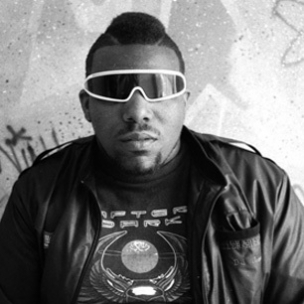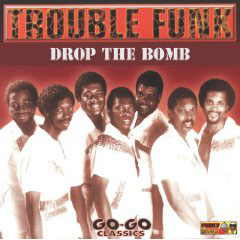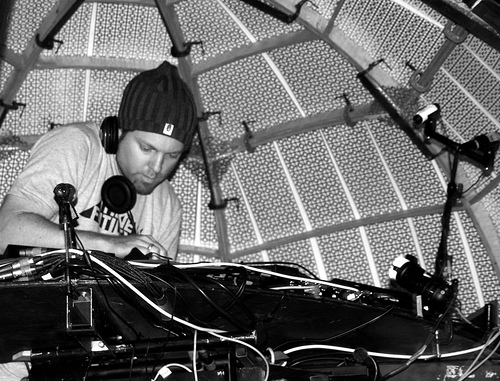Now take this approach to the way you hear hip hop, the most prominent and popular genres which has throughout its history and development relied heavily upon the use of samples.
Let's take a look at the musical history of the genre.
Hip hop set its roots in the Groundsville housing projects, New York in the early 1970s. A new culture began to form out of the social deprivation and financial hardship of some of the city's poorest residents, initially orientated in largely in expression through dance. These beginnings had huge implications on the development of the music of hip hop culture. The early dancers in hip hop culture favoured dancing over drum breaks, and it was when DJ Kool Herc began to cycle the drum breaks of popular songs of the time, that the idea of 'looping' came into being (using a technique called beat juggling, playing the same record simultaneously on two vinyl decks, playing through the drum break on one record, before switching to the beginning of the drum break on the second record when the first break reaches its conclusion. Juggling between the two records the drum break could be extended indefinitely to the delight and advantage of the 'Break' dancers). The idea of manipulating a segment of an existing piece of music, tailoring it to the occasion and context provided the inspiration for the use of break beats in hip hop, which have persisted up to this present day.

Rock Steady Crew - http://www.bad-perm.com/wp-content/uploads/2011/10/rocks-steady-crew1-530x250.jpg
The Amen Break - Many say the most sampled piece of music of all time
James Brown - Funky Drummer. The break comes at 5:15.
However, at odds with the trends you might notice looking retrospectively, the earliest examples of sampling in hip hop take the form of synthesised samples, such as the drum sounds used in Afrika Bambaataa's - 'Planet Rock', Run D.M.C.'s 'It's like that' and 'Sucka MCs', songs assembled solely from digital samples.

Afrika Bambaataa http://assets.rollingstone.com/assets/images/artists/304x304/afrika-bambaataa.jpg
It was not until later in the 1980s when producers such as Marley Marl and Rick Rubin (producing on behalf of the Beastie Boys) began to toy with the idea of assembling entire songs, even albums, from samples taken from records and pre-existing music of the time. Marley Marl initially began doubling his synthesised drum sounds with those from recorded drum breaks, a simple concept which added an incredible amount in the way of timbre, aesthetic and soul to the music he produced and went on to influence a great many other producers. It is this use of sampling however, that would eventually pose the Beastie Boys legal issues, and trend of record industry 'fight-back' at hip hop acts which started back in 1991, with a case between Grand Upright Music vs. Warner Bros. Records, regarding Biz Markie's 'Alone Again', and its use of sampling from Gilbert O'Sullivan's work of the same name.

Trouble Funk - http://www.rocksbackpages.com/public/img/artists/11901.jpg
The legal issues posed by sampling have had a huge influence on hip hop music's development through the past twenty years, coming to act as the single-strongest guide dictating the use of samples in the commercial realm of the genre to this day. The 1991 lawsuit led to some hugely significant changes in the use of sampling, with artists from that point on requiring clearance from the record label which owned the song they wanted to sample.
The Beastie Boys 1989 album, "Paul's Boutique", was one of the first albums to be constructed almost entirely from samples, although it was such practice which was to cause them untimely and problematic legal action only last year. Poorly-timed, the lawsuit brought to the Beastie Boys by 'Tuff City' record label, for their use of drum breaks from releases from the band Trouble-Funk was filed the day before member Adam Yaunch succumbed in his battle against cancer. It is representative of the mechanic by which the legal system surrounding sampling in hip hop operates; bands may retrospectively face action for their use of samples decades earlier. In many regards, the use of a sample from a well-known piece of music has come to represent as much a statement of wealth as buying an expensive car or flashing ice in music videos for some contemporary hip hop artists, and hip hop has been growing away from the art surrounding the use of samples to build a musical landscape.

DJ Shadow - http://blog.dialaphone.co.uk/wp-content/uploads/2012/07/DJ-Shadow.jpg
Through the past 10 years however, a plethora of producers have looked again to favour the use of samples in their beat production, and fans of the genre and critics of the music alike have shown a real warmth towards the resurrection of what was for a time, considered a dying art form. DJ Shadow paved the way for this resurgence by playing on the legal systems Achilles heal; sampling records that were so obscure, or editing and processing the samples beyond all recognition. His 1996 album, 'Entroducing...' consisted solely of samples, but has yet to draw in legal-issues due to its seemingly indeterminate sample makeup.
So what does sampling in Hip Hop represent?
DJ Shadow - Midnight in a Perfect World (Entroducing.....)
Run D.M.C. - Suck MCs (Check out those digital synthesized samples!)
Source Direct - The Cult. Jungle Music is a genre that formed out of the manipulation and editing of drum breaks.

